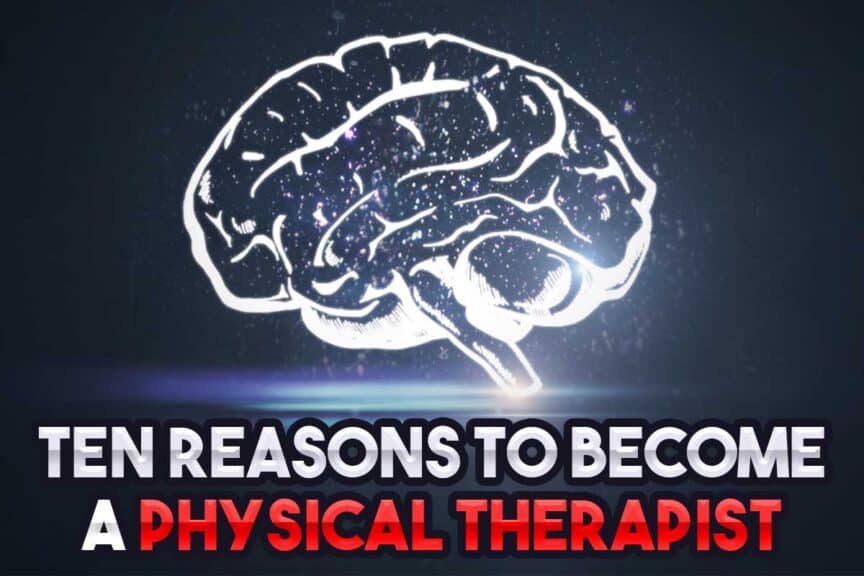Making the decision to pursue a specific career can be an intimidating process. It can take time and effort to know whether or not it’s something you can truly see yourself doing. Then once you decide to pursue it, there’s a lot to figure out and a lot to accomplish in order to see it through and make it happen. Becoming a physical therapist is a prime example of this.
If you’re currently thinking about becoming a physical therapist or are just wondering what some of the unique, potential benefits within this career may be, then this article will hopefully serve as a helpful starting point for you as you continue to explore whether or not a career in physical therapy could be the right move to make.
Remember: my goal here is not to try and persuade you to become a physical therapist, rather to present to you (and thus enlighten you) towards just a few unique (and great) things a career in physical therapy can offer.
A quick overview of the ten reasons in this article to become a physical therapist
- Working one-on-one when it comes to helping others
- Helping others see what their bodies truly are capable of
- Being a source of comfort and a guide to those who are in pain
- Being an advocate and a voice to those who are in need
- Inspiring others to take action, become healthier & live happier lives
- High levels of job security for quite some time
- There are a variety of clinical specialties to choose from
- There’s A variety of work environments, settings and locations to choose from
- There is always more to learn and discover, no matter how experienced you become
- You’ll have continual opportunity to mentor young, aspiring physical therapists if you would like to do so
All of these reasons will be discussed in detail below, so be sure to keep reading!
Also, if you are interested in learning more about what a career in physical therapy can lead to, be sure to check out my other blog articles: A Career in Physical Therapy: Here’s How to Know if it’s Right for You and Job Satisfaction: Do Physical Therapists Enjoy their Jobs?
Remember: Any career and job will have its own unique unique challenges
Physical therapy is a pretty sweet gig, and I get truly excited when someone decides that it’s the profession that they want to become a part of. Of course, I have a strong bias in believing that it’s one of the most amazing and rewarding professions out there, but I’m allowed to be biased as long as I acknowledge it, haha. But it’s worth being fully transparent in this post by saying that no single job or career will ever be entirely perfect.
Just like any other job, physical therapy is not 100% exclusively sunshine and rainbows every single day. The profession has its battles, including bureaucratic tape, insurance companies, various notes to write, and so on. When it comes to treating others, certain patients whom you treat can be challenging and/or frustrating in a variety of ways. But a good physical therapist knows this and continually works to enhance the various skills needed within clinical practice to alleviate these issues as best as possible.
I mention all of that just to help you have a realistic and fully transparent view of the world of being a PT. But let me say that the good far, far, far outweighs the bad! I certainly wouldn’t have written this article (let alone built this website!) if it wasn’t such an amazingly great profession.
Alright, let’s get to the amazing benefits of being a PT:
1. Working one-on-one when it comes to helping others

When it comes to helping and treating others as a physical therapist, you largely due so through one-on-one interactions with your patient. If you’re someone who dreams of interacting with large groups of people or audiences as your daily requirements, physical therapy likely isn’t for you.
But if you’re someone who loves genuine, one-on-one interactions, making genuine connections and prefers to work with individuals through these means, then the daily requirements of physical therapy will serve you well.
Working directly with a patient means that you will need great communication skills along with strong emotional intelligence if you want to help your patients as best as possible, as strong communication skills are important when working and communicating with an individual one-on-one.
2. Helping others see what their bodies are truly capable of

You’ll likely find great value in working as a physical therapist if you have a strong desire to help others better understand the abilities of the human body and how it can become stronger, healthier and less pain-riddled. The human body is an absolutely mind-glowingly powerful machine. Helping other individuals discover this for themselves as you help them to get out of pain, recover from injury and/or restore mobility throughout the body can be an absolutely life-changing experience for them.
When patients learn and discover firsthand just what their bodies care capable of and can overcome, their lives get filled with newfound confidence and hope. You as a physical therapist not only get to play the leading role in helping them discover and experience this, but you also have front-row tickets to the ways their lives are enriched as a result. Until you’ve experienced it for yourself, it’s hard comprehend just how amazing it feels to help others throughout this process.
3. Being a source of comfort and a guide to those who are in pain

Comforting and guiding others as they go through physical pain is an incredibly noble thing to do, and it means the absolute world to many of your patients when you do this with them. If you’re drawn to the idea of a career that affords you the role of being both a comforter and a guide to others, physical therapy may just have what you’re looking for.
A central and integral part of being a physical therapist is the ability to sympathize and/or empathize with the challenges your patients are facing. Doing so often provides them with psychological comfort. And believe it or not, science is showing us that a healthier state of mind reduces perceptions of pain and disability within the body.
Patients also expect guidance when it comes to helping them navigate the challenges of their physical rehabilitation. As a physical therapist, your job is to act like a guide for your patient throughout the rehabilitation process. It’s as if you help create a road map for them that shows them what it will take and how they can successfully get from point A to point B in their rehabilitative journey.
We do this a lot as physical therapists, so if this intrigues or excites you, then maybe a career as a physical therapist is calling you.
4. Being an advocate and a voice to those who are in need

If you find the idea of being an advocate to less fortunate populations one that is important to you and thus something that you want to be associated with as part of your career, then becoming a physical therapist may be a good move to make.
The American Physical Therapy Association (APTA) sees advocacy as one of its core values (the link will take you to their core values document), and for good reason; physical therapists recognize that not every individual is afforded the same opportunities and abilities when it comes to major aspects of life such as physical ability, socioeconomic status, education and other critical aspects that can greatly impact an individual’s quality of life.
There are a multitude of populations, situations and policy changes for the public for which physical therapists are advocates. They advocate through a variety of means and ways with the ultimate goal of creating a better life for the general public.
Notable advocacy events in recent years have been advocating for the general public having direct access to physical therapy services without first needing a referral from a medical doctor, promoting physical therapy to decrease opioid addiction in those with chronic pain and advocating for the public to choose physical therapy over unnecessary surgery as a means to alleviate or reduce physical pain.
So if you are someone who believes advocacy of others to be an important and inherently meaningful aspect to what you do for a career, there is plenty of advocacy that takes place in the profession of physical therapy
5. Inspiring others to take action, become healthier & live happier lives

If living a physically active lifestyle is important to you AND if you’re someone who loves to inspire others while leading by example, you’ll likely find a career in physical therapy all the more rewarding. When you know first-hand the difference that being physically active can make within multiple domains of your life, you not only become more passionate about it, but more uniquely qualified to help others to experience those same life-giving benefits.
Physical activity is meant to be enjoyable, and helping others find physical activities and pursuits that they will truly enjoy is something that all physical therapists should strive for. Whether it’s a competitive sport or a leisurely activity such as gardening, bowling or walking through a park, there’s an activity out there for everyone. As a physical therapist, you’ll get to help so many patients see the physical, social, emotional, mental and spiritual benefits that regular physical activity can make in one’s life if you love physical activity yourself and choose to lead by example.
6. High levels of job security for quite some time

The profession of physical therapy isn’t going anywhere anytime soon. In fact, it’s only going to increase in demand as the current generation of boomers continues to age. And that’s just for the boomers. Injury is an unfortunate reality of life for everyone, no matter their age, gender or any other demographic factor. People will always get injured in one way or another, will need to learn how to move better, how to enhance their physical wellness and much more.
In addition to aging and the inevitable-ness of physical injuries that human beings can sustain, modern technology is well over a hundred years away before it will have the ability to replicate the abilities and requirements of what human hands can and must do in the clinic. Hands (and all their mind-blowing abilities) are absolutely necessary when it comes to use in physical therapy, and technology has a long, long way to go before it can replicate what the hands of humans are capable of.
But it’s not just hands that technology has to contend with. Physical therapists need to routinely use the gross and fine motor skills of their entire bodies; they need to use their eyes; their clinical reasoning skills; their communication skills and emotional intelligence to get the job done when it comes to effective physical rehabilitation. This is something that modern technology has no chance of replicating, much less surpassing within either my lifetime or yours.
Oh, and you can’t outsource physical therapy to another country. See? High levels of job security.
7. There are a variety of clinical specialties to choose from

You may not realize this, but physical therapy has a variety of clinical specialties to choose from. While the vast majority of the population tends to think of physical therapy as dealing strictly with injuries to muscles, bones and joints (the clinical specialty known as orthopedics), there are actually many more clinical specialties and respective populations that physical therapists work with!
The American Board of Physical Therapy Specialties (ABPTS) currently recognizes ten clinical specialties that physical therapists can pursue and attain credentialing within after graduating from physical therapy school. Each of these clinical specialties requires unique, additional training requirements that can only be pursued once standard PT school requirements have been completed.
The ten recognized specialties by the ABPTS are:
(The following links will take you to the respective specialty page on the ABPTS website.)
- Cardiovascular and pulmonary
- Clinical electrophysiology
- Geriatrics
- Neurology
- Oncology
- Orthopaedics
- Pediatrics
- Sports
- Women’s health
- Wound management
Specializing in one of these ten designations will not only allow you to work within a particular realm or with a particular demographic that you may be more interested in or passionate about, but carving out a particular niche for yourself within the field of physical therapy can also help you to stand out more within your field. What’s even better, since you become more specialized within your field, it can often times increase your earnings as well. It pays (literally) to specialize.
While not all physical therapists choose to pursue a specialty designation, there are definitely some serious merits towards doing so. So, if you are interested in any of these specialties, know that they are a real possibility for you if you become a physical therapist.
8. A variety of work environments, settings and locations to choose from

While most of the general public would think of a typical clinical office setting (such as a private or professional building) when they think of working as a physical therapist, the fact of the matter is that physical therapists are found in a variety of locations and settings.
Depending on the type of physical therapy or specialty that you’d like to practice, physical therapists can work in environments ranging from private clinics to hospitals, fitness facilities, schools and even travelling from one patient’s home to the next (this last one is known as “home health” physical therapy).
So, don’t think that you’ll have to work in a traditional physical therapy clinic if you want to become a physical therapist. Depending on the type of patients you want to focus on treating, there can be a lot of different environments and settings where you could end up. You can wind up staying in one particular location or you can even wind up travelling all over the country (this is a niche of physical therapy known as “travel PT”). Maybe you’ll even find yourself travelling with a sports team if you’re hoping to one day be a physical therapist for a team.
9. There is always more to learn and discover, no matter how experienced you become

If the thought of choosing a career that will one day no longer intellectually challenge you is a scary thought, rest assured that it won’t happen if you become a physical therapist. Now, the caveat with this is that you don’t want to end up as a mediocre therapist who resorts to just “going through the motions” each day and thus ceases to continually learn.
The human body is the most amazing machine we know of in this universe and as much as we know about it, we ultimately know next to nothing about it in the grand scheme of things. As a result, new treatment techniques are always being discovered, new therapeutic devices are being created and new findings on all things pertaining to how the human body works and recovers from injury and dysfunction are constantly being uncovered.
This means that should you have the hunger and passion to do so, there will always be more to learn as a physical therapist. The more you learn, the more well-versed you become in all aspects of helping effectively rehabilitate your patients. You’ll likely find your career to be more fulfilling and stimulating as well.
As an example, the emerging world of pain science has begun to shed light on just how complex pain and its subsequent mechanisms really can be. As a result, it has lead to radically new (and effective) ways to treat various types of pain that traditional physical therapy intervention has been largely ineffective towards.
So, if you’re someone who always wants to be learning (and has the willingness to do so), you’ll have no shortage of new things to always learn and implement into practice, regardless of how long you practice as a physical therapist.
10. You’ll have continual opportunity to mentor young, aspiring physical therapists if you would like to do so

If you’re someone who loves to share knowledge and mentor others, you’ll be happy to know that you’ll have the opportunity to do so throughout your career as a physical therapist.
Once you become a licensed and practicing physical therapist with a bit of experience underneath your belt, you just might have the opportunity to begin sharing your knowledge, experience and skills with physical therapy students or those who are hoping to one day head into physical therapy school.
Just like any other health profession, licensed physical therapists play an important role in helping PT students get their skills up to par. This is often done by having the school of the PT student set up an official clinical internship with you and/or your facility. From there, students will spend a varying number of weeks working underneath you as you offer guidance and further clinical training. This can be accomplished in practically any clinical setting.
Aside from it just feeling really good to help pay everything forwards by helping the upcoming generation of physical therapists, mentoring others helps ensure that you keep your skills and clinical reasoning sharp for when educating others.
So if you dig the thought of being a mentor or at least someone who is able to share your knowledge and expertise with those following in your footsteps, know that it can be something you can continually do once you enter clinical practice as a physical therapist. How cool is that?!
Concluding remarks
While there’s plenty more than just ten reasons as to why becoming a physical therapist could be the right career move for you to make, the ten reasons within this article have hopefully opened your eyes towards some of the great benefits that await if you choose to pursue a career in physical therapy.
Above all else, remember that every career and job has its own individual ups and downs, but so long as you’re passionate about what you do and are willing to work hard enough to set up a career on the terms you’re after, you’ll have by far more good days than bad.
If any of the reasons within this post opened your eyes towards the profession of physical therapy or has sparked your curiosity in any sort of way, I’d encourage you to reach out to someone within the profession (including me) to learn a bit more and have any further questions answered. Choosing a career and deciding to pursue it can be an overwhelming feeling at first, but as you take more time to explore what its all about, you’ll gain an understanding as to whether or not its the right move for you to make.
Grind hard. You’ve got this.
Related articles
- A Career in Physical Therapy: Here’s How to Know if it’s Right for You
- Job Satisfaction: Do Physical Therapists Enjoy Their Jobs?

Hi! I’m Jim Wittstrom, PT, DPT, CSCS, Pn1.
I am a physical therapist who is passionate about all things pertaining to strength & conditioning, human movement, injury prevention and rehabilitation. I created StrengthResurgence.com in order to help others become stronger and healthier. I also love helping aspiring students and therapists fulfill their dreams of becoming successful in school and within their clinical PT practice. Thanks for checking out my site!

